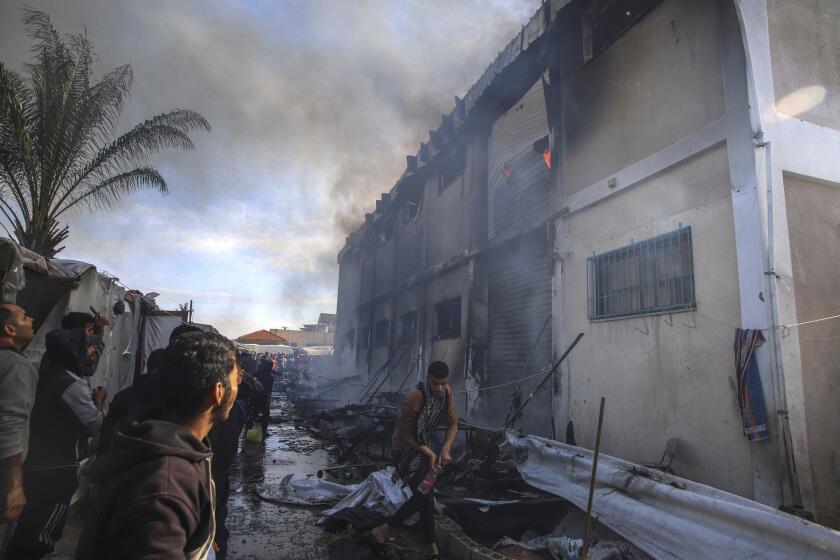Suspected drones used by Yemen’s Houthi rebels attack 2 more ships in Mideast waters
- Share via
TEL AVIV — Two ships traveling in Middle East waters were attacked by suspected Yemen Houthi rebel drones early Tuesday, authorities said, the latest assaults in the Iranian-backed fighters’ campaign of targeting vessels over Israel’s war on Hamas in the Gaza Strip.
The first attack happened in the southern part of the Red Sea, west of the Yemeni port of Hodeida, with the projectile causing “slight damage” to the vessel’s windows on the bridge, the British military’s United Kingdom Maritime Trade Operations said. A small vessel had been nearby the ship before the attack, it added.
The private security firm Ambrey identified the vessel as a Barbados-flagged, United Kingdom-owned cargo ship. No one was hurt on the vessel, which suffered “minor damage,” the firm said.
A second ship came under attack later Tuesday off Yemen’s southern port city of Aden, Trade Operations reported. Ambrey identified it as a Marshall Islands-flagged, Greek-owned vessel coming from the U.S. heading to India.
“The vessel reported an explosion 50 meters off its starboard side,” Ambrey said. “No injuries or damage were reported.”
Later, a military spokesman of the Iranian-backed Houthi rebels, Brig. Gen. Yahya Saree, claimed in a statement that the rebels attacked two vessels, one American and one British, in the Red Sea. He provided no evidence to support the claim.
The Houthis made no claim about the attack off the coast of Aden.
One of the ships the Houthis claimed they attacked — the Morning Tide — matched details provided by Ambrey. Tracking data showed it to be in the Red Sea near the reported attack.
The Morning Tide’s owner, British firm Furadino Shipping, said no one was hurt in the attack and the ship was continuing to Singapore.
Since November, the rebels have repeatedly targeted ships in the Red Sea over Israel’s war against Hamas in Gaza. But they have frequently targeted vessels with tenuous or no clear links to Israel, imperiling shipping in a key route for trade among Asia, the Mideast and Europe.
The International Court of Justice’s ruling comes at an early stage in South Africa’s case alleging that Israel’s actions in Gaza amount to genocide.
In recent weeks, the United States and the United Kingdom, backed by other allies, have launched airstrikes targeting Houthi missile arsenals and launch sites.
The U.S. and Britain struck 36 Houthi targets in Yemen on Saturday. An air assault Friday in Iraq and Syria targeted other Iranian-backed militias and Iran’s Islamic Revolutionary Guard in retaliation for a drone strike that killed three U.S. troops in Jordan.
The U.S. military’s Central Command also acknowledged an attack Monday on the Houthis, in which it reported attacks on what it described as two Houthi drone boats loaded with explosives.
American forces “determined they presented an imminent threat to U.S. Navy ships and merchant vessels in the region,” the military said. “These actions will protect freedom of navigation and make international waters safer and more secure for U.S. Navy vessels and merchant vessels.”
More than three months into the Israel-Hamas war, the families of hostages held in Gaza have grown disillusioned with Israel’s military operations.
Separately, the White House on Tuesday walked back an earlier statement that it had alerted the Iraqi government prior to carrying out Friday’s Iraq and Syria strikes. National Security Council spokesman John F. Kirby told reporters shortly after the strikes that Iraqi officials were given advance warning about the U.S.-led operation. He said the assertion was based on information that was provided to him by U.S. officials.
“Turns out that information was incorrect,” said Kirby. He added that he regretted the error.
Kirby’s initial comments generated controversy in Iraq and vehement denials by officials in Baghdad. Iraqi Prime Minister Mohammed Shia al-Sudani sought to walk a delicate line between the United States and Iran-backed armed groups in his country, many of which have associated political parties in the coalition that brought his government to power.
Sudani has condemned attacks on U.S. troops, but has also pushed back against U.S. retaliatory strikes. Some of those strikes have hit facilities connected to the Popular Mobilization Forces, a coalition of mostly Shiite, Iran-backed militias that was officially made part of the Iraqi military after joining the fight against Islamic State in 2014 — although in practice, the militias continue to operate largely outside of state control.
Sudani has also called for an end to a U.S.-led coalition formed to fight Islamic State. Some 2,500 U.S. troops are stationed in Iraq as part of the mission. In late January, Iraqi and U.S. military officials launched a series of formal discussions on winding down the coalition’s presence. The talks were then suspended after the Jan. 28 strike in Jordan that killed three U.S. troops but are expected to resume again in the coming weeks.
Iraq’s representative to the U.N., Abbas Kadhim Obaid, speaking as the U.N. Security Council met Tuesday, condemned the U.S. strikes, as well as recent strikes launched by Turkey and Iran on Iraqi turf, as a breach of the country’s sovereignty.
Also on Tuesday, Turkey’s defense minister visited Baghdad to discuss regional security issues. The meeting between Iraqi officials and Turkey’s top diplomat comes amid ongoing military operations by Ankara against the Kurdistan Workers’ Party, a Kurdish separatist group that has launched periodic attacks in Turkey.
More to Read
Sign up for Essential California
The most important California stories and recommendations in your inbox every morning.
You may occasionally receive promotional content from the Los Angeles Times.












